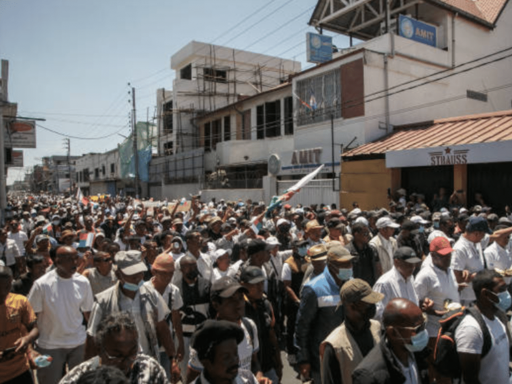On Saturday 11 October, groups of soldiers defied orders and joined the youth-led protesters in Madagascar’s capital, Antananarivo. The next day, the CAPSAT military unit declared that it was taking control of the country’s military in solidarity with the anti-government demonstrations.
In response, president Rajoelina on Sunday declared that an attempted coup against him was underway.
Madagascar protests rage
The breakaway soldiers were part of the elite CAPSAT unit, which aided Rajoelina back in the 2009 mutiny. Soldiers at the group’s Soanierana district base posted a video on social media calling on their fellow troops to prevent aircraft from taking off. They expressed apparent solidarity with the protesters:
Let us join forces, military, gendarmes and police, and refuse to be paid to shoot our friends, our brothers and our sisters…
Close the gates, and await our instructions. Do not obey orders from your superiors. Point your weapons at those who order you to fire on your comrades in arms because they will not take care of our families if we die.
Saturday’s demonstrators entered the city’s May 13 Square for the first time during the recent wave of protests. The Square was an important site for previous uprisings, and has been heavily guarded over the last few weeks.
Police used tear gas and stun grenades in an attempt to force the assembled crowds to retreat. However, soldiers and armoured vehicles arrived to escort the protesters into the square, accompanied by shouts and cheers from the citizens.
Madagascar has seen ongoing protests since 25 September. However, Saturday’s was one of the biggest yet. The UN has already declared that over 100 people have been injured and 22 have been killed so far. However, Rajoelina claimed that only 12 have died, whom he callled “looters and vandals”.
Military takeover
A CAPSAT commander, Colonel Michael Randrianirina, stated that the gendarmerie – police commanded by the defence ministry – had shot dead one of his soldiers. He also said that his troops had exchanged fire with the security forces who were trying to shut down the protests.
However, at least one unit of the gendarmerie also joined the counter-government protesters on Sunday. In a statement broadcast on Real TV, the Intervention Forces of the National Gendarmerie said:
All use of force and any improper behaviour towards our fellow citizens are prohibited, as the gendarmerie is a force meant to protect people and not to defend the interests of a few individuals.
On Sunday morning, CAPSAT released a video statement through local news media declaring that it was taking over Madagascar’s military. Later that same day, CAPSAT general Demosthene Pikulas was named chief of army staff.
Armed forces minister Manantsoa Deramasinjaka Rakotoarivelo attended Pikulas’ ceremony, and told journalists that he gave the new chief his “blessing”. Although he refused to publically join the call for Rajoelina’s resignation, he did state that:
the army has a responsibility to restore calm and peace throughout Madagascar.
Rajoelina: whereabouts unknown
The president dissolved his government on 30 September in response to the unrest. He also installed an army general, Ruphin Fortunat Zafisambo, as Prime Minister on 6 October. Many among the new cabinet ministers were also chosen from the armed forces, public security, and police.
Zafisambo’s appointment came as a shock to all, as his name didn’t appear on any of the lists of potential candidates that were circulating for several days beforehand. On Saturday night, Zafisambo appeared on state television to declare that his government is:
fully ready to listen and engage in dialogue with all factions – youth, unions or the military.
The president’s exact whereabouts are currently unknown. However, on Sunday, Rajoelina released a statement insisting that he is in the country and “managing national affairs”. It also said that:
The presidency of the republic wishes to inform the nation and the international community that an attempt to seize power illegally and by force, contrary to the constitution and to democratic principles, is currently under way.
The president’s office added that:
In view of the extreme gravity of this situation [Rajoelina’s office] strongly condemns this attempt at destabilisation and calls upon all forces of the nation to unite in defence of constitutional order and national sovereignty.
As of this morning, relative calm had returned to the streets of Antananarivo. BBC News reported that almost all of the shops in the city centre have opened for business, along with the market stalls and street vendors.
However, the US Embassy in Madagascar characterised the situation as “highly volatile and unpredictable”. Likewise, the African Union has urged all involved, “both civilian and military, to exercise calm and restraint.”
Featured image via the Canary
From Canary via this RSS feed


